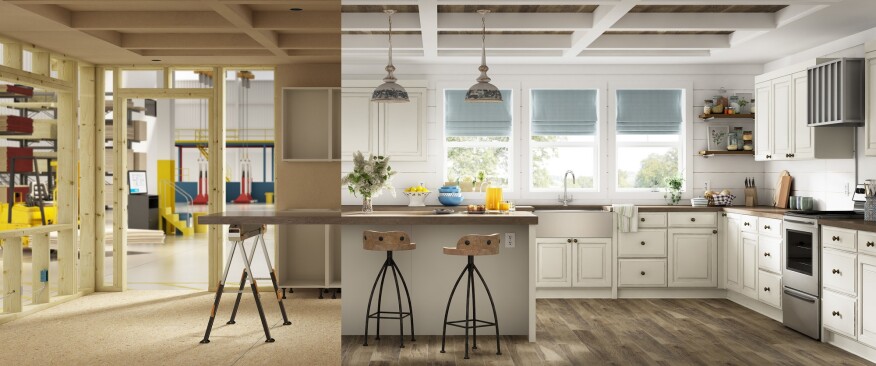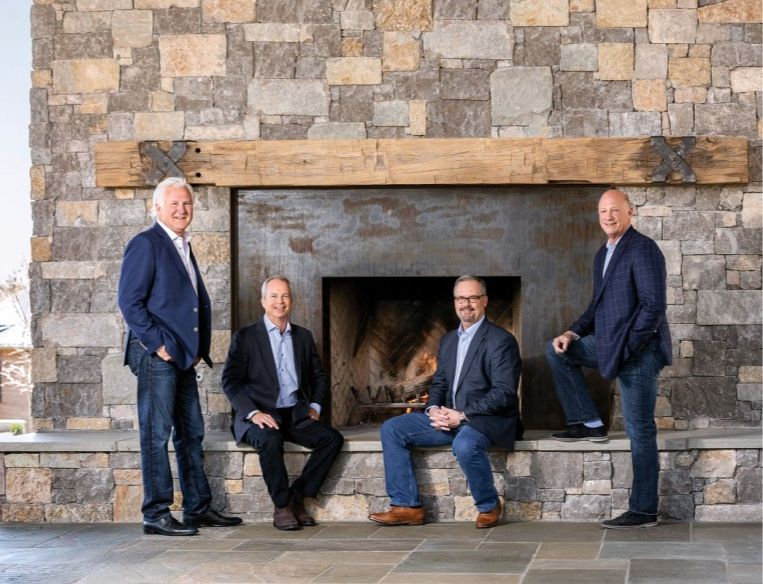See how the company has evolved into one of America’s leading home builders.
Two essential properties, fit and fitness, form a double-helix genetic code that powers the half-trillion-dollar Berkshire Hathaway empire. Cultural fit—whose basis is human trust and values alignment—and business and economic fitness can scale, self-sustain durably over time, and produce value regeneratively. Hard assets, like land, on the other hand, produce value that may be cyclically fickle, fragile, and finite.
Now, Warren Buffett’s credo for iconic business success weaves together a genetic sequence straight out of a Horatio Alger rags-to-riches story. He’s constitutionally allergic to whitewashing business risk or threats. No one’s likely ever to accuse Buffett of looking at any detail, factor, or force—pro or con—through rose-colored lenses.
Yet according to Kevin Clayton, whom Berkshire’s chief sage and strategist has grown to trust implicitly over the years since Berkshire Hathaway acquired Clayton in 2003, even Buffett is capable of letting his imagination take a flight of fancy with the best of us.
“It would be Mr. Buffett’s dream scenario for a family to pull up to a driveway in a car insured by Geico, to a home sold by a HomeServices of America real estate agent, financed through our mortgage units, built by Clayton with materials from Johns Manville and MiTek and Lubrizol and others, a Benjamin Moore and Acme Brick exterior, and Shaw carpeting indoors,” says Clayton, president and CEO of Clayton Homes. “That’s not a strategic master plan or any kind of imperative for us as Berkshire subsidiaries. Still, Mr. Buffett’s real passion is for America-produced products and services that families want and need over long periods of time.”
Clayton Homes has made a name for itself in a business at best, discounted, and more often dismissed, dissed, and derided for much of its six-decade history, as a builder and purveyor of double-wides and HUD code mobile homes on wheels and platforms. For much of Clayton’s six-decade history, its executive management has been intent on elevating both the manufactured housing business and its customers, raising safety, quality, durability, and energy performance of the homes, and the financial stature of people who buy them.
Now Clayton’s story has a new chapter. The narrative over the past few years could easily serve as a classic case study from the Buffett playbook on principles of company acquisition. In such a playbook, people, a future-proof operations model and trust figure more importantly in deals than physical plants, product outputs, or other hard assets, including home sites. Clayton’s everyday business philosophy, to “open doors to a better life,” presupposes a mind-meld of both vision and mission, where profit and opportunity cross paths with risk and challenge for other competitors in the field.
This explains Clayton’s full-on assault to crack the code of more widely available new sub-$150,000 homes. Most market-rate single-family builders—save D.R. Horton, LGI, and perhaps, NVR—simply find it too profitable to serve a shrinking universe of more well-heeled customers, and cannot make new houses pencil profitably for so little as $125,000 or $130,000.
For Kevin Clayton, getting to see up close what’s worked so well for Buffett has served as both a gently applied kick in the butt to go do more, and a constant well of trusting support in what he’s already doing.
“Mr. Buffett is thinking 100 years out,” Clayton says of his mentor. “He could not care less if a downturn happens in the next quarter or the next five years. He’s challenging us to come up with a plan for the longer haul.”
Dream big. Mind the everyday minutia. Expect tough challenges around the next corner. Serve families and their pursuit of America’s promises of upward mobility to those who work for it. These flashing arrows of each Berkshire operating unit point to principles at the foundation of the Clayton Homes leadership’s drive from the outer fringe segment of manufactured home building into the heart and soul icon of the American dream itself, the single-family starter home.

A big-picture roadmap, careful attention to people and details, business model resilience, and a relentless laser focus on the starter home buyer’s journey and experience each serve as ladder rungs of a strategic transformation whose ramifications and impacts could alter home building development, investment, and construction itself.
A national infrastructure of 40-or-so manufacturing plants—whose output sells through 350 retail outlets—a distribution network of 1,200 independent retailers, and an owned mortgage finance company, as well as home insurance, includes a vertically integrated building supply chain that produces and distributes 42% of the rough and finished components and products that go into the company’s homes. Clayton is in about every segment of housing that one can imagine: modular homes, tiny homes, manufactured housing, college dormitories, military barracks, and apartments. And now, it also features a robust, top 20–ranked single-family, site-built portfolio with operations flanking its heartland-focused manufactured home businesses in what land sellers might classify as B, C, and D lot markets and submarkets.
Clayton’s got goals going right now to overcome two big challenges, and its meteoric and potentially game-changing success at both is why the company is what may be a counterintuitive choice for our 2019 Builder of the Year.
One is to evolve from the No. 1 builder of manufactured homes to a new class of single-family home builder, purpose-focused to crash affordability’s steepening barriers among working American households. The second is to do it by marrying the best and most innovative practices of both the on-site stick-built world of detached single-family builders with the off-site, vertically integrated, and increasingly automated factory-assembly world of manufactured housing. Clayton may very well have created a new species of hybrid home building that can actually drive cost savings into asking price relief for buyers.
How? We’ll explore that, but first a bit of the Clayton backstory, and how it morphed from nearly six decades of HUD code housing into the Builder 100’s fastest-growing private builder over the past three years.

Clayton, The Man and The Brand
Kevin Clayton started working as a young kid for his father, who grew up picking cotton bolls on patches of ground his father before him worked in East and West Tennessee. Humility runs in the one-time sharecropper Clayton family veins, and so, too, does a work ethic with an American dream plotline. “Our whole family worked in the business, and I gravitated to it,” says Clayton, 55.
As a young man he did take some time away from the business, working in the restaurant industry and eventually getting his MBA from the University of Tennessee. There, he studied management techniques that would allow him to evolve from the entrepreneurial signature management style of his father.
Clayton put some of that schooling into practice immediately after graduate studies, when his father asked him to take charge of Clayton’s southeastern region, and then allowed him—in a sequence of four- to five-year stints in the late 1980s and early ’90s—to run Clayton’s finance company, home building operations, and retail company. By the time his father was ready to retire in July 1999 from his day-to-day role as chief executive officer of the publicly traded enterprise, young Kevin was fully groomed to step up to the position.
“My dad—educated as a lawyer—built the business with instincts and a style as a micro-manager, and I learned an awful lot from seeing his grasp of details and his involvement in decisions at every level,” Kevin says of a company that ranked as a Forbes “Best Small Company in America” from 1989 to 1992. “Fortunate for me, during my MBA program I was exposed to participative management styles and Kaizen principles that encouraged constant process improvement with a great deal more latitude shared among leaders.”
Kevin Clayton’s two key mentors—his father and Warren Buffett—each encouraged and allowed for growth, focus, and an aptitude at placing confidence in his brain trust.
“He’s the reason I’m here,” says Keith Holdbrooks, president of Clayton Home Building Group and, in Kevin Clayton’s mind, one of home building’s smartest, most visionary strategic thinkers. “Kevin—who I’d competed with and grew up with in manufactured home building as CEO of Southern Energy Homes—called me up in 2006, and said he’d talked to Mr. Buffett about exploring my company, which essentially would give Clayton a vertical-integration, distribution, and network of materials sources. It was a total 100% handshake deal. That’s the foundation of how we’ve dealt with all of our home builders, establishing the trust factor. Once you do that, as with all relationships, trust puts you at a different level.”
Talk to any of the principals among the eight home building companies who have become part of the Clayton strategic plan, portfolio, and family over the past four years, and that “different level” comes through loud and clear.
Read More

